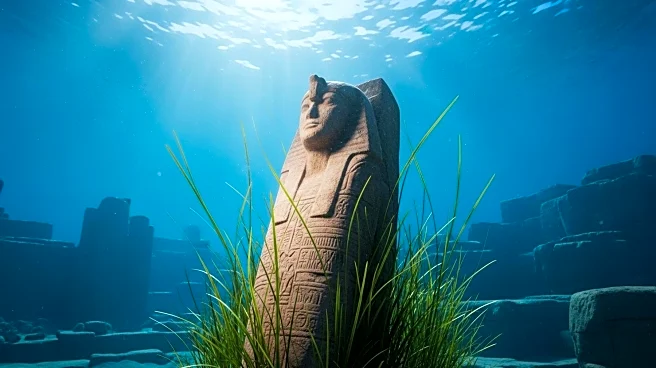What's Happening?
The Egyptian Ministry of Tourism and Antiquities has announced a significant discovery near Egypt's Mediterranean coast that may provide clues to the location of Cleopatra's tomb. The discovery involves a sunken port near the archaeological site of Taposiris Magna, which was previously thought to hold only historical and religious significance. Dr. Kathleen Martínez, an archaeologist and National Geographic Explorer, led the research that uncovered an ancient underground tunnel and various artifacts, including amphorae, anchors, and monumental columns. These findings suggest the presence of a port or harbor that has been submerged for over a millennium. The discovery was aided by Dr. Robert Ballard, an oceanographer known for finding the RMS Titanic wreckage, who helped map the area using advanced oceanographic equipment.
Why It's Important?
This discovery is crucial as it may finally lead to the uncovering of Cleopatra's tomb, a mystery that has intrigued historians for centuries. The artifacts found at the site, including coins bearing Cleopatra's image, suggest a strong connection to the queen, supporting the theory that her remains could be nearby. The collaboration between archaeologists and oceanographers highlights the importance of interdisciplinary approaches in solving historical mysteries. If Cleopatra's tomb is found, it could provide invaluable insights into ancient Egyptian history and the Ptolemaic dynasty, potentially reshaping historical narratives and attracting global interest in Egypt's archaeological heritage.
What's Next?
The next steps involve further exploration and excavation at the site to uncover more evidence that could confirm the presence of Cleopatra's tomb. Continued collaboration between archaeologists and oceanographers will be essential to map and analyze the submerged structures. The discovery may prompt increased funding and interest in Egyptian archaeology, potentially leading to more advanced technological applications in the field. The findings could also spark renewed interest in Cleopatra's life and reign, influencing cultural and educational discussions worldwide.
Beyond the Headlines
The discovery raises ethical considerations regarding the preservation and management of underwater archaeological sites. As technology enables access to previously unreachable locations, it is crucial to balance exploration with conservation efforts. The potential uncovering of Cleopatra's tomb also poses cultural implications, as it may challenge existing narratives about her life and reign, influencing how historical figures are perceived and studied.









